
Parvovirus B19 Structure Human Parvovirus B19 B19 Virus Pdb 1S58 — Stock Photo © vitstudio
Une sérologie permet d'effectuer la r echerche d'une exposition à un agent pathogène, son état d'immunisation et potentiellement son état de protection. " En fonction du type profil d'immunoglobines trouvée (IgG et/ou IgM) et du type de sérologie, on peut savoir si l'infection est aigüe (donc en cours) ou ancienne " explique le Dr Kuentz.

(PDF) Parvovirus B19 Infection in Pregnancy
Laboratory Studies. Most patients with parvovirus B19 (B19V) infection do not require laboratory studies because symptoms are mild and the illness resolves over 5-7 days. Parvovirus serology (anti-parvovirus B19 immunoglobulin M [IgM] and immunoglobulin G [IgG] antibodies) can be determined using enzyme-linked immunoassay (ELISA.

Clinical features of three patients positive for parvovirus B19 IgM and... Download Table
Minimum Volume. 0.5 mL serum. Additional Information. The prevalence of parvovirus B19 IgG antibodies increases with age. The age-specific prevalence of antibodies to parvovirus is 2-9% of children under 5 years, 15% to 35% in children 5 to 18 years of age, and 30% to 60% in adults (19 years or older). Test sent to Mayo Medical Laboratories.
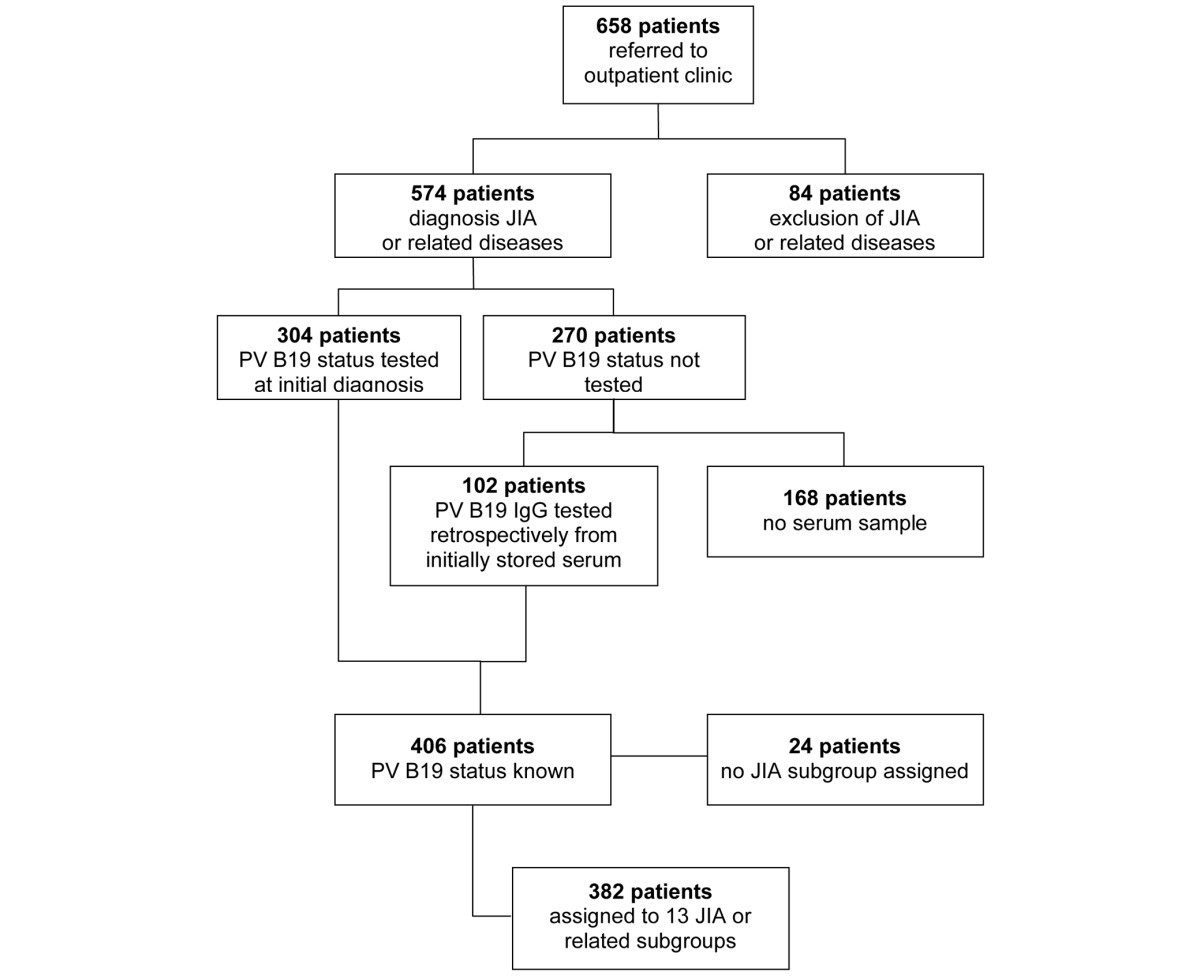
Seroprevalence of parvovirus B19 IgG in children affected by juvenile idiopathic arthritis
If both IgG and IgM are positive, then this indicates recent infection within 7-120 days and the fetus is at risk of B19 transmission. If IgG results are negative with positive IgM results then that indicates acute infection with no previous antibodies against B19 and the fetus is at greater risk as the mother is not immune.

Parvovirus B19 symptômes et traitements
Parvovirus B19 is a common infectious disease that spreads from person to person and most often results in no or very mild symptoms. The virus sometimes targets the cells that mature into red blood cells. Infection causes a temporary stoppage of the production of these cells. The effect of this stoppage is only apparent in individuals who don.
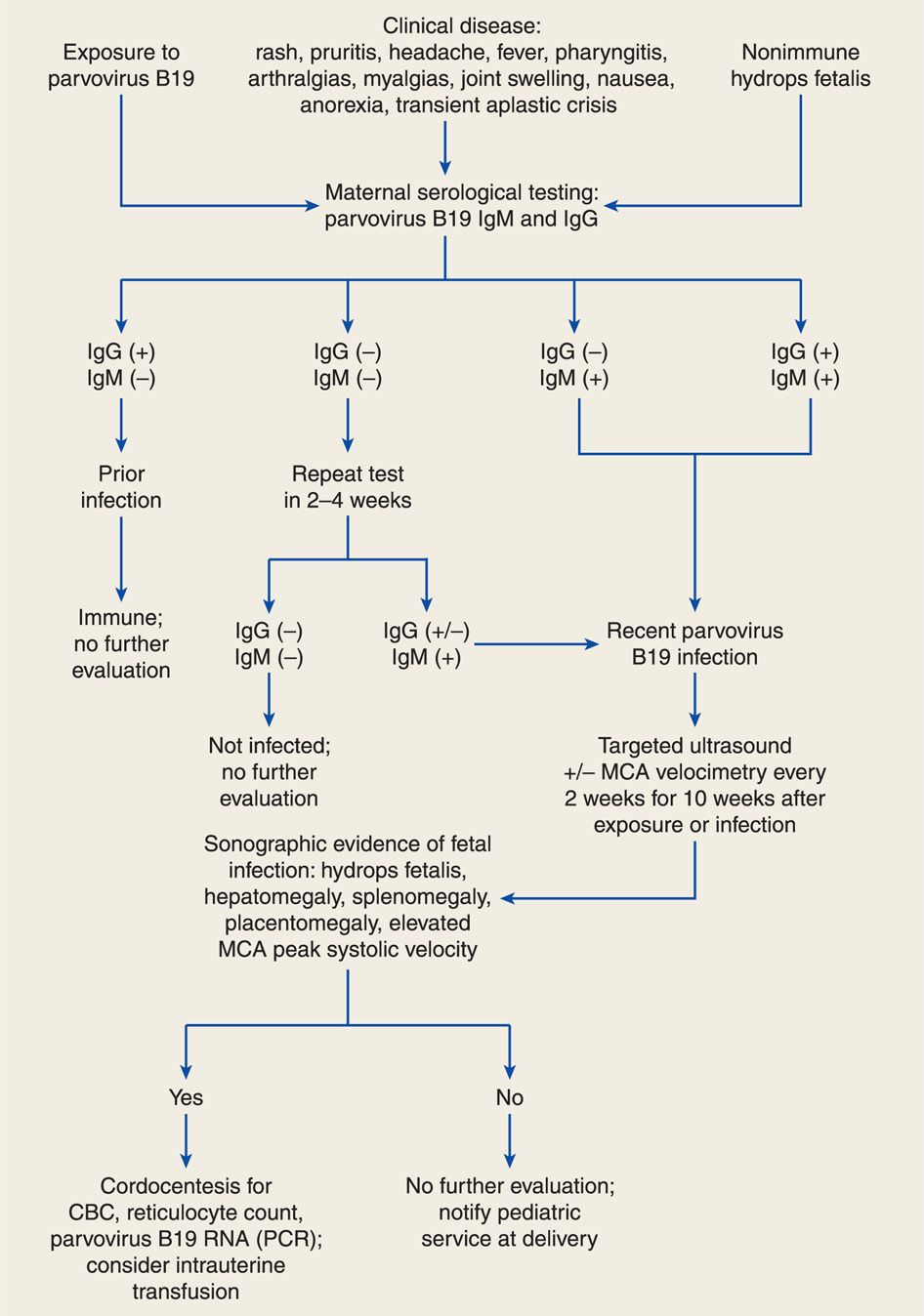
Infectious Diseases Obgyn Key
Parvovirus B19 (B19V) is a member of the family Parvoviridae, genus Erythrovirus.B19V-specific IgG and IgM react differently against conformational and linear epitopes of VP1 and VP2 antigens, leading to the development of IgG avidity and epitope type specificity (ETS) enzyme immunoassays (EIAs) for distinguishing past from recent infection.

Parvovirus B19 and Pregnant Women A Bibliographic Review
The prevalence of parvovirus B19 IgG antibodies increases with age. The age-specific prevalence of antibodies to parvovirus is 2% to 9% of children under 5 years, 15% to 35% in children 5 to 18 years of age, and 30% to 60% in adults (19 years or older). Most acute infections with parvovirus B19 are diagnosed in the laboratory by serologically.

Biologie médicale État des connaissances COVID19 Biopyrénées
Background: Human Parvovirus B19 (B19V) is a DNA virus, transmitted through respiratory secretions, hand-to-mouth-contact, blood transfusion and trans-placental transfer.It causes high mortality and morbidity in pregnant women, thus contributing to poor maternal and child health. B19V has been neglected due to dearth of epidemiological data.

Risk Factors for Parvovirus B19 Infection in Pregnancy Dermatology JAMA The JAMA Network
In pregnant women exposed to parvovirus B19, obtain IgG and IgM serology as soon as possible following exposure - Negative IgG and IgM results indicate that the mother is not immune and that no evidence of acute infection is noted. In this case, repeat the tests in 3 weeks. In patients with clinically significant anemia or transient aplastic.
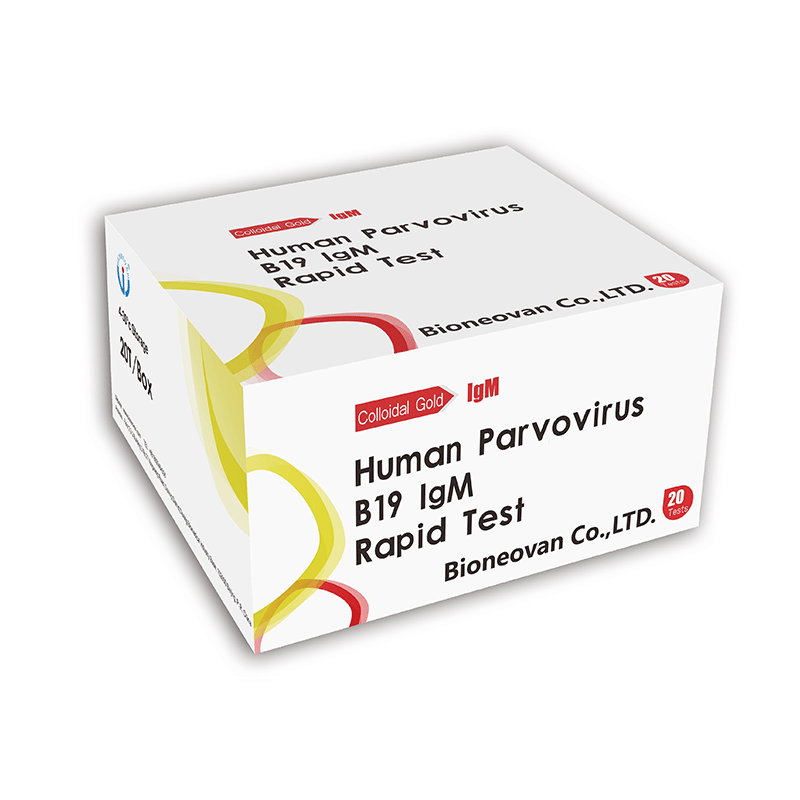
Human Parvovirus B19 Rapid TestsBioneovan Co.,Ltd
Le parvovirus B19 est virus à ADN monocaténaire qui entraîne une suppression transitoire de l'érythropoïèse qui est légère et asymptomatique, sauf chez l'enfant qui présente des hémoglobinopathies sous-jacentes (p. ex., une drépanocytose) ou d'autres troubles des globules rouges (p. ex., une sphérocytose héréditaire) et qui peuvent provoquer des crises aplasiques transitoires.
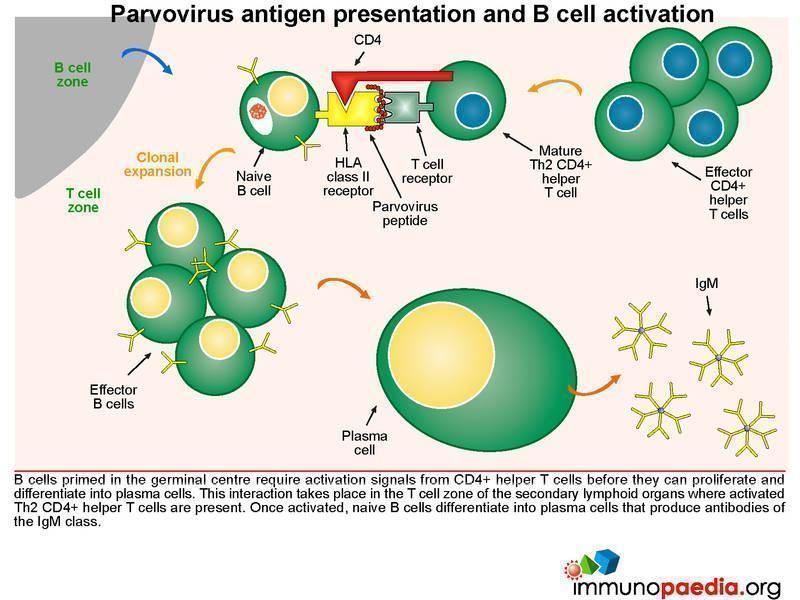
Parvovirus B19 Case Study Immunopaedia
Parvovirus B19 Antibodies, IgG and IgM, Serum. Serologic detection of recent or past parvovirus B19 infection. This assay may be used to determine the serostatus of patients at risk for infection with parvovirus B19. Alongside clinical evaluation and other laboratory findings, results may be used to determine if the patient has recent or past.
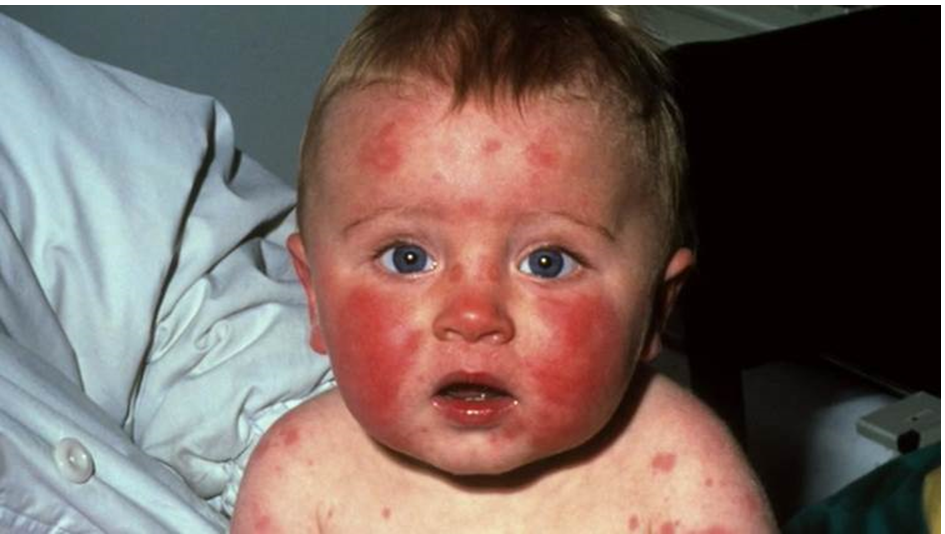
קובץParvovirus B191.PNG ויקירפואה
Assessment of B19V-specific IgG and IgM antibody levels was performed using two sandwich enzyme immunoassays (EIA) (Parvovirus B19 IgM and IgG Enzyme Immunoassay kits from Biotrin® (Dublin, Ireland)) following the manufacturer's instructions.. Kooistra et al. analyzed 67 B19V DNA-positive samples with a B19V DNA load between 10 6 and 10 13.

What is PARVOVIRUS B19 ANTIBODIES PANEL IgG & IgM Test
Communément appelé cinquième maladie, le mégalérythème épidémique, ou érythème infectieux, est une infection virale causée par le parvovirus humain B19.
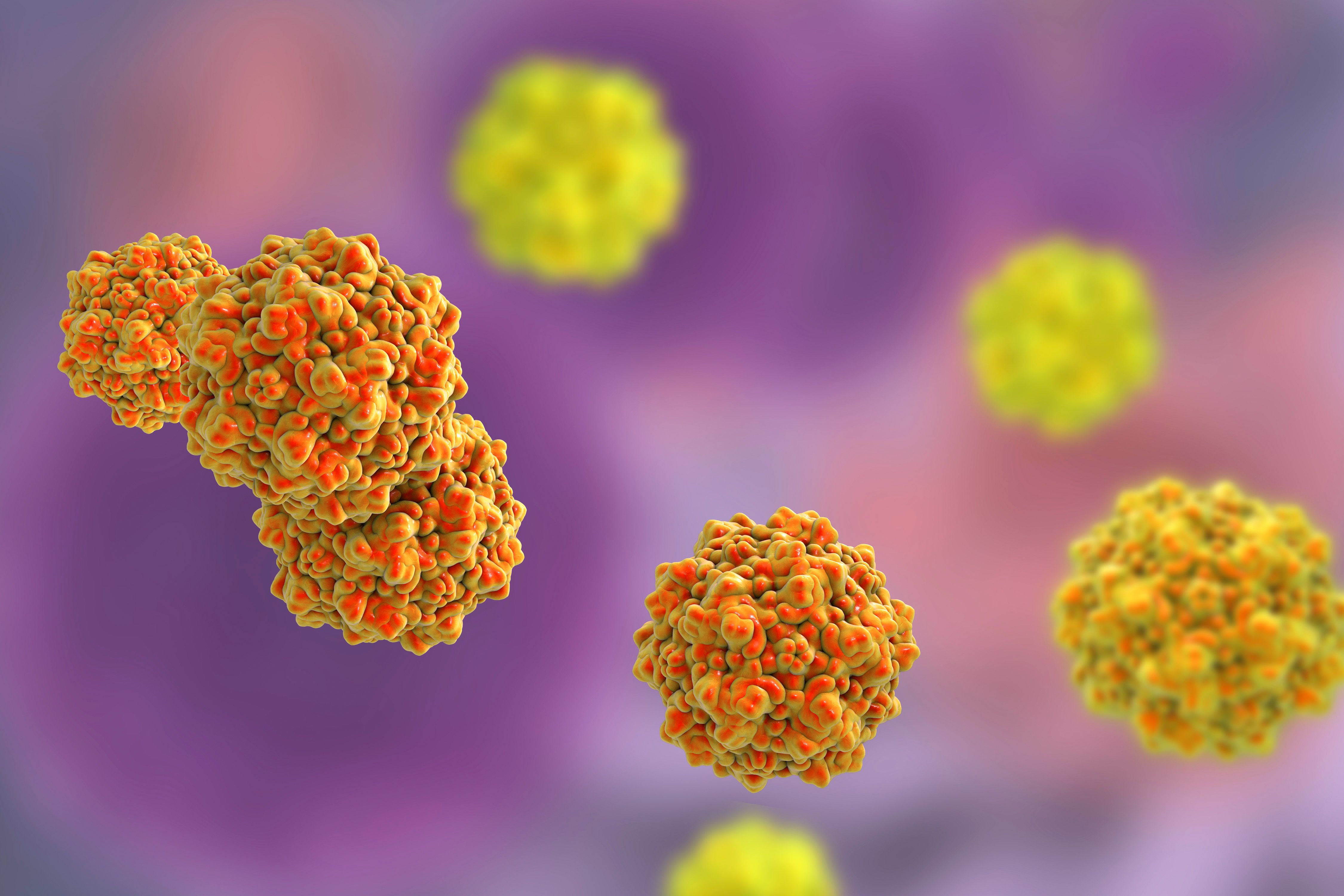
Case Study Intravenous Immunoglobulin Infusion Effectively Treats Parvovirus B19 Infection
Parvovirus B19. Parvovirus B19 is part of a family of viruses that can cause infection. Most parvoviruses infect animals, such as cats and dogs. People cannot get infected with these parvoviruses. Dogs and cats can get vaccinated to protect them from parvoviruses that commonly affect them. Parvovirus B19 only infects people.

B19 parvovirus capsid protein Stock Image C013/9612 Science Photo Library
Background: Human parvovirus B19 (B19V) is one of the blood-borne viruses. The virus can be transmitted to susceptible individuals by blood or blood products.. The current systematic review and meta-analysis aimed to estimate the overall prevalence of B19V DNA, anti-B19V IgG, and anti-B19V IgM antibodies in blood donors worldwide. Methods:.

Schematic representation of the genome of parvovirus B19 with the... Download HighResolution
The prevalence of parvovirus B19 IgG antibodies increases with age. The age-specific prevalence of antibodies to parvovirus is 2-9% of children under 5 years, 15-35% in children 5 to 18 years of age, and 30-60% in adults (19 years or older).. Likely non-specific false positive IgM reactivity.
- Dofus Touch Mise A Jour
- Friday Night In San Francisco Album
- Theatre Paris Les Fourberies De Scapin
- Stranger Things Max Et Eleven
- Quels Sont Les 3 éléments Du Triangle De Feu
- Theatre De La Ville Espace Cardin
- Mairie Lavans Les Saint Claude
- One Piece Version Kai Vf
- Veste Running Sans Manche Femme
- Calcul Du Point De Rosée Isolation
